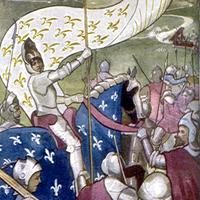32. India at Last
"O'er Oriental waters now they fly Upon the Indian seas. And now their chosen task is almost done. " —CAMOENS.
A few days' cruising along the eastern coast brought Vasco da Gama to the merchant town of Mozambique, only a few degrees to the south of the equator. Here, however, the chief of the district proved unfriendly, and the Portuguese commander sailed on to Melinda, a trading city on the open coast. It was Easter Day when they anchored in front of the town. News of their coming had spread like wildfire along the coast, and the Indian merchant-ships in port were dressed out with flags in their honour. The king proved a friend in need.
"I will give you pilots," he said, "to take you to the city of Calicut, which is in the country where pepper and ginger grow. " It was August before they were ready to sail. The king was very sad at letting them go, and watched till he could see them no longer.
"Lord God have mercy, farewell!" cried the Portuguese sailors as they sailed away into the open sea, leaving the coast of Africa.
For twenty days they sailed to the east, guided by the pilot, and then Vasco da Gama sighted the long faint line of the Indian coast for which he had sailed so far.
"That is India," said the pilot, nodding his head in the direction to which all eyes were strained. "This is India," echoed the sailors in content, gazing anxiously from the masthead. It was a tremendous moment for the Portuguese commander when, after three hundred and four days of tossing on the ocean, he arrived at Calicut, on the coast of India. It was more than he could bear, the poet Camoens tells us. Falling down on his knees, he spread his hands abroad to the blue heavens above him, while in the depth of his joy he could find no words. His heroic task was accomplished; he had fulfilled the desire of his king, the dream of Prince Henry of Portugal in days gone by.
People soon flocked, to see the Portuguese ships and sailors, for they soon discovered that Vasco da Gama had gold and silver on board in exchange for the spices of the East. Their king, too, was anxious to hear of the great Christian King of Portugal.
Vasco da Gama, accompanied by twelve of his best-looking sailors, went on shore, taking presents for the Eastern monarch. They took magnificent pieces of scarlet cloth and crimson velvet, a splendid gilt mirror, fifty knives with ivory handles and glittering blades, and other tokens of Portuguese wealth, so that the king swore eternal friendship with his "brother" the King of Portugal, and gave his representatives free leave to buy and sell as they pleased at Calicut. Moreover, he presented da Gama with a beautiful jewelled sword, in a scabbard of velvet and gold, as a solemn pledge of friendship.
Then the Portuguese loaded their ships with the treasures of Calicut, and, enriched with presents from the king, they sailed away for home. With a fair wind and under the guidance of pilots they soon reached Melinda again, sailed past Mozambique, past what we now know as Zanzibar, and rounded the dreaded Cape of Good Hope in fair weather. With shouts of joy they reached Lisbon, exactly two years and eight months after their departure.
The ships had been seen, and the king was waiting to receive Vasco da Gama and eager to hear his news. With his long beard—which had never been cut since he left Lisbon—the successful explorer stepped ashore, and kneeling low before his king he kissed his hand again and again, saying: "Sire, all my hardships have come to an end at this moment. " The news spread far and wide, and great were the rejoicings throughout Portugal, and indeed throughout Europe. "Another road had been discovered to a country which, famed for its riches, had been the envy of Western nations from the earliest times—the dream of every youth of every age from the days of Solomon. Did we say rejoicings everywhere in Europe? There was one city that did not rejoice at this famous discovery, one city—proud, beautiful, rich—which seemed stunned by the news.
"It is the worst news that ever arrived," they said sadly. For Venice, amid her waste of waters, was ruined. No longer "did she hold the gorgeous East in fee." Her traffic, her commerce had been taken from her. She had been the first city in Europe
"till the unwelcome tidings came That in the Tagus had arrived a fleet From India, from the regions of the sun, Fragrant with spices—that a way was found, A channel opened, and the golden stream Turn'd to enrich another. Then she felt Her strength departing, and at last she fell, Fell in an instant, blotted out and razed. "

